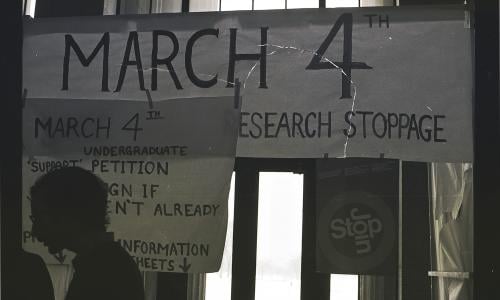On March 4, 1969, the day on which the Union of Concerned Scientists held its very first public event at MIT, the role and mission of the nascent group was envisioned in a statement entitled "Beyond March 4" distributed to the participants. Written on behalf of the UCS founders by Kurt Gottfried, then a visiting professor at MIT and currently chair emeritus of the UCS board of directors, the following is an excerpt from this document:
"...the Stone Age may return on the gleaming wings of Science, and what might now shower immeasurable material blessings upon mankind, may even bring about its total destruction. Beware, I say; time may be short."
We are immersed in one of the most significant revolutions in man's history. The force that drives this revolution is not social dissension or political ideology, but relentless exploitations of scientific knowledge. There is no prospect that this revolution will subside; on the contrary, it will continue to transform profoundly our modes of living and dying. That many of these transformations have been immeasurably beneficial goes without saying. But, as with all revolutions, the technological revolution has released destructive forces, and our society has failed to cope with them. Thus we have become addicted to an irrational and perilous arms race, and we are unable to protect our natural environment from destruction.
Can the American scientific community all those who study, teach, apply or create scientific knowledge help to develop effective political control of the technological revolution? Our proposal is based on the conservative working hypothesis that the existing political system and legal tradition have sufficient powers of adaptation to eventually contain and undo the destruction and peril generated by technological change.
At first sight recent history appears to indicate that our democratic system of government will fail the test just described. Let us recognize, however, that an intricate pattern of political and technological developments have conspired to subvert profoundly the democratic process. The government that we see today is in many respects no longer democratic because the vast bulk of its constituency cannot begin to scrutinize some of the gravest issues. One can claim that this has always been the case, but in so doing one tacitly ignores the radically altered relationship between the government and the citizenry. For we must remember that before the advent of nuclear weapons, government decision could only on rare occasion threaten the existence of any large portion of mankind. Now such decisions are a common occurrence, and they pass virtually unnoticed. This is not simply due to the habitual apathy of the electorate. A more important cause is surely the shroud of secrecy that enfolds so much of the government's operations. Today many tens of billions of dollars pass through the hands of classified government programs and agencies, and hundreds of thousands of Americans hold security clearances. Both of these figures have grown enormously in recent decades.
The technological revolution tends to erode democracy even in the absence of secrecy. The vastly increased importance and complexity of technology has, in effect, increased the ignorance of the public and its elected representatives, and thereby concentrated power in the administration and the military. This trend has been greatly amplified by external threats, both real and imagined. In the face of these developments, the Congress has largely surrendered its constitutional duties.
The scientific community has various responsibilities, most of which it has ably discharged. Thus it has created the basic knowledge and developed the applications that make the continuing technological revolution possible; it has trained an ample supply of technical manpower, and it has advised the administrative and military branches of the government.
Our community has the additional responsibility to educate the public, to evaluate the long-term social consequences of its endeavor, and to provide guidance in the formation of relevant public policy. This is a role it has largely failed to fulfill and it can only do so if it enters the political arena.
Only the scientific community can provide a comprehensive and searching evaluation of the capabilities and implications of advanced military technologies. Only the scientific community can estimate the long-term global impact of an industrialized society on our environment. Only the scientific community can attempt to forecast the technology that will surely emerge from the current revolution in the fundamentals of biology.
The scientific community must meet the great challenges implied by its unique capacity to provide these insights and predications. It must engage effectively in planning for the future of mankind, a future free of deprivation and fear. This important endeavor, in which we seek your active participation, stems from our conviction that even though the technological revolution has greatly benefited mankind, it has also released destructive forces that our society has failed to control.
Far-reaching political decisions involving substantial applications of technology are made with virtually no popular participation. It is our belief that a strengthening of the democratic process would lead to a more humane exploitation of scientific and technical knowledge, and to a reduction of the very real threats to the survival of mankind.
We ask you, as a member of the scientific community, to join us in a concerted and continuing effort to influence public policy in areas where your own scientific knowledge and skill can play a significant role. The issues which are of primary concern to us are survival problems where misapplication of technology literally threatens our continued existence. These fall into three categories: those that are upon us, as in the nuclear arms race; those that are imminent, as are pollution-induced climatic and ecological changes; and those that lie beyond the horizon, as, for example, genetic manipulation.
